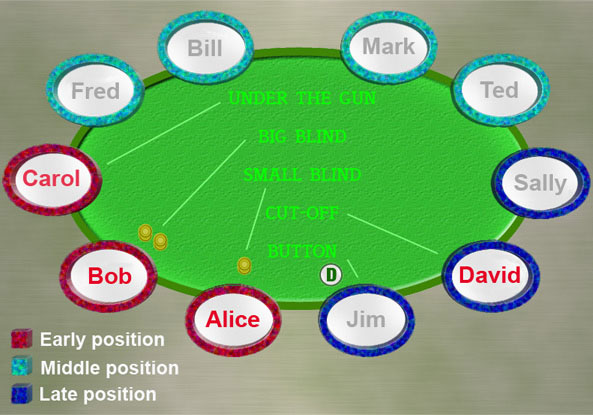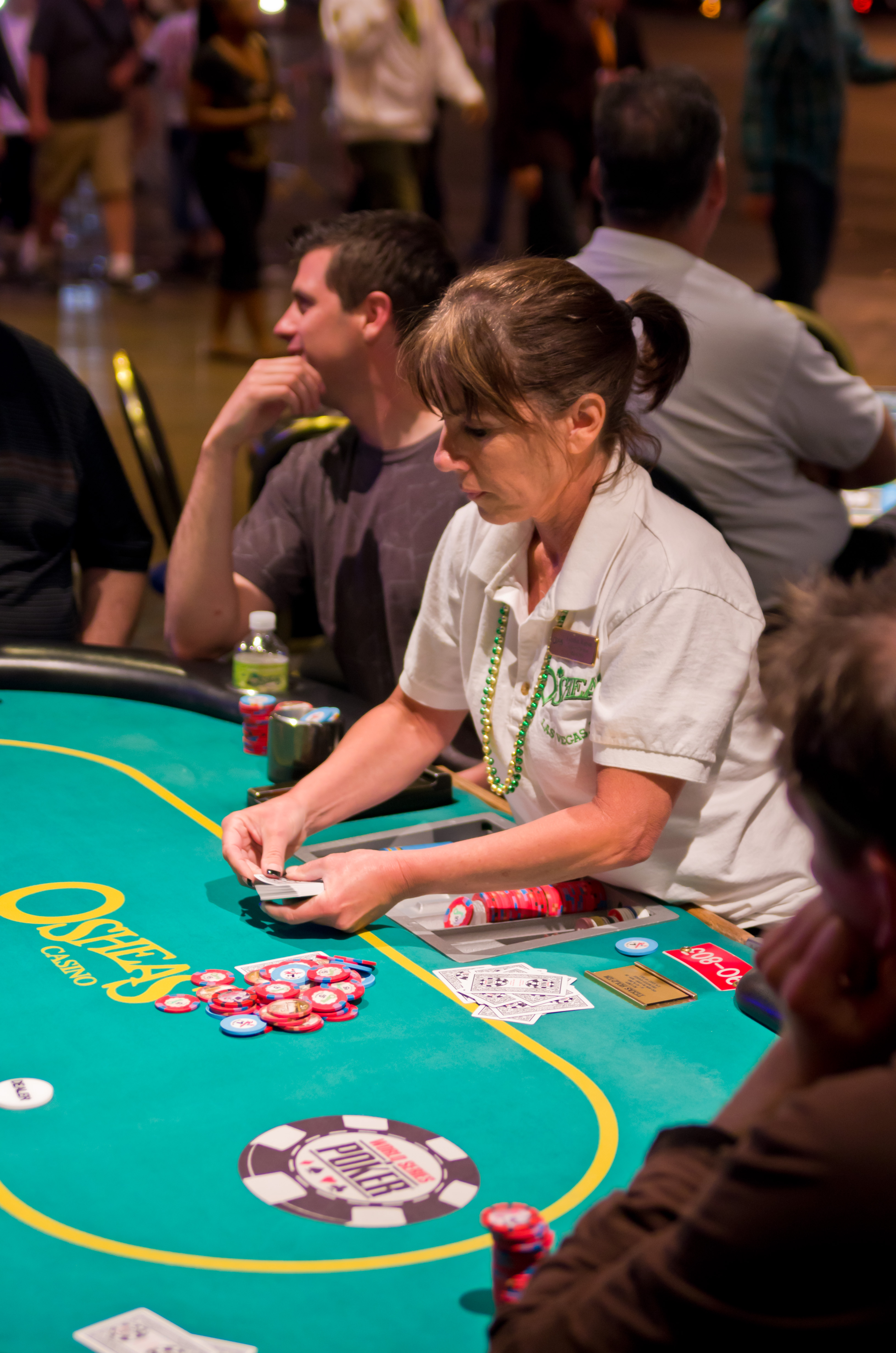|
M-ratio
In no-limit or pot-limit poker, a player's M-ratio (also called "M number", "M factor"PokerGreed.com: Understand what hands to play in a tournamen Accessed 2008-03-25 or just "M") is a measure of the health of a player's chip stack as a function of the cost to play each round. In simple terms, a player can sit passively in the game, making only compulsory bets, for ''M'' laps of the dealer button before running out of chips. A high ''M'' means the player can afford to wait a high number of rounds before making a move. The concept applies primarily in poker tournament, tournament poker; in a cash game, a player can in principle manipulate his M at will, simply by purchasing more chips. A player with a low ''M'' must act soon or be weakened by the inability to force other players to fold with aggressive raises. The term was named after Paul Magriel. Calculation The M-ratio is calculated by the formula: :M = \frac For example, a player in an eight-player game with blinds of $5 ... [...More Info...] [...Related Items...] OR: [Wikipedia] [Google] [Baidu] |
Q-ratio (poker)
The Q-ratio (also known as Q number or just Q) is used in poker tournament strategy. It is also known as the "weak force." The Q-ratio describes the relation of the player's stack to the tournament players' average stack. A low Q-ratio — less than 1 — indicates a below-average chip stack, implying disadvantage against opponents. It is an addition to the M-ratio ("strong force") and usually doesn't play a large role in tournament decision-making. However, its importance grows as the table average M-ratio drops. Q-ratio on freezeouts is calculated using the following method.''Harrington On Hold 'em: Volume II; The Endgame'', p.127 :Q = \frac \times \frac For example, in a tournament starting with 50 players who have 10,000 chips, of which 30 have been eliminated, and one player has 20,000 chips: :Q = \frac \times \frac = 0.8 This player's accumulation of chips has not kept pace with the elimination of players, and their chip stack is now below average. On rebuy and ... [...More Info...] [...Related Items...] OR: [Wikipedia] [Google] [Baidu] |
Paul Magriel
Paul David Magriel Jr. (pronounced Ma-grill) (July 1, 1946 – March 5, 2018) was an American professional backgammon player, poker player, and author based in Las Vegas, Nevada. Magriel became New York State Junior Chess Champion (January 1967) at the age of 20, while a student at New York University. Backgammon Known as X-22 on the backgammon circuit, Magriel arguably won more major backgammon tournaments than any other player in the world. He was widely considered the world's premier backgammon teacher, an original and clear-thinking theorist and one of its best players. The sobriquet X-22 originates from Magriel's simulation of a real backgammon tournament (compare simultaneous exhibition in chess) with 64 boards, designated X-1 through X-64, in which the player designated "X-22" has eventually won. Magriel first came to prominence on the backgammon circuit when he won the World Backgammon Championship in 1978. From 1977 to 1980, he wrote weekly backgammon columns for ' ... [...More Info...] [...Related Items...] OR: [Wikipedia] [Google] [Baidu] |
Harrington On Holdem
''Harrington on Hold 'em'' is a series of poker books about poker strategy, particularly for Texas hold 'em poker tournaments. They were all written by Dan Harrington and Bill Robertie and published by Two Plus Two Publishing. Background The ''Harrington on Hold 'em'' series of books were written by Bill Robertie and Dan Harrington, a professional poker player who has earned over US$4.5 million during his poker career. He has won two World Series of Poker bracelets, including one from the 1995 World Series of Poker Main Event, and he has made it to four final tables in total at the World Series of Poker (in 1987, 1995, 2003, and 2004). Synopsis ''Volume 1: Strategic Play'' (), which contains seven key sections, begins by introducing the reader to poker and its history, along with a glossary of poker terms. The book is not written for novices to the game, therefore it does not include some of the more basic information about the game, such as poker hands, the game's mechanics, be ... [...More Info...] [...Related Items...] OR: [Wikipedia] [Google] [Baidu] |
Betting (poker)
In the game of poker, the play largely centers on the act of betting, and as such, a protocol has been developed to speed up play, lessen confusion, and increase security while playing. Different games are played using different types of bets, and small variations in etiquette exist between cardrooms, but for the most part the following rules and protocol are observed by the majority of poker players. Procedure Players in a poker game act in turn, in clockwise rotation (acting out of turn can negatively affect other players). When it is a player's turn to act, the first verbal declaration or action they take does NOT bind them to their choice of action; this rule allows a player to think out loud at the table without being penalized for doing so. Until the first bet is made each player in turn may "check", which is to not place a bet, or "open", which is to make the first bet. After the first bet each player may "fold", which is to drop out of the hand losing any bets they have ... [...More Info...] [...Related Items...] OR: [Wikipedia] [Google] [Baidu] |
Poker
Poker is a family of comparing card games in which players wager over which hand is best according to that specific game's rules. It is played worldwide, however in some places the rules may vary. While the earliest known form of the game was played with just 20 cards, today it is usually played with a standard deck, although in countries where short packs are common, it may be played with 32, 40 or 48 cards.Parlett (2008), pp. 568–570. Thus poker games vary in deck configuration, the number of cards in play, the number dealt face up or face down, and the number shared by all players, but all have rules that involve one or more rounds of betting. In most modern poker games, the first round of betting begins with one or more of the players making some form of a forced bet (the '' blind'' or ''ante''). In standard poker, each player bets according to the rank they believe their hand is worth as compared to the other players. The action then proceeds clockwise as each play ... [...More Info...] [...Related Items...] OR: [Wikipedia] [Google] [Baidu] |
Poker Tournament
A poker tournament is a tournament where players compete by playing poker. It can feature as few as two players playing on a single table (called a "heads up poker, heads-up" tournament), and as many as tens of thousands of players playing on thousands of tables. The winner of the tournament is usually the person who wins every poker chip in the game and the others are awarded places based on the time of their elimination. To facilitate this, in most tournaments, blind (poker), blinds rise over the duration of the tournament. Unlike in a Cash game, ring game (or cash game), a player's chips in a tournament cannot be cashed out for money and serve only to determine the player's placing. Buy-ins and prizes To enter a typical tournament, a player pays a fixed ''buy-in'' and at the start of play is given a certain quantity of tournament poker chips. Commercial venues may also charge a separate fee, or withhold a small portion of the buy-in, as the cost of running the event. Tournamen ... [...More Info...] [...Related Items...] OR: [Wikipedia] [Google] [Baidu] |
Dan Harrington
Dan Harrington (born December 6, 1945) is a professional poker player, best known for winning the Main Event at the 1995 World Series of Poker. He has earned one World Poker Tour title, two WSOP bracelets, and over six million dollars in tournament cashes in his poker career. He is also a member of the Poker Hall of Fame. Harrington chose his own nickname "Action Dan" even though he is known for being a tight conservative player. He is a distant cousin to both professional golfer Pádraig Harrington and former NFL quarterback Joey Harrington. Early life and business career Harrington was born in Cambridge, Massachusetts. Currently residing in Santa Monica, California, Harrington is a former champion backgammon player and U.S. chess master (he won the 1971 Massachusetts State Chess Championship). Before becoming a poker professional and businessman, Harrington worked for many years as a bankruptcy lawyer. He also played poker against Bill Gates while Gates was at Harvard. Some o ... [...More Info...] [...Related Items...] OR: [Wikipedia] [Google] [Baidu] |
Betting In Poker
In the game of poker, the play largely centers on the act of betting, and as such, a protocol has been developed to speed up play, lessen confusion, and increase security while playing. Different games are played using different types of bets, and small variations in etiquette exist between cardrooms, but for the most part the following rules and protocol are observed by the majority of poker players. Procedure Players in a poker game act in turn, in clockwise rotation (acting out of turn can negatively affect other players). When it is a player's turn to act, the first verbal declaration or action they take does NOT bind them to their choice of action; this rule allows a player to think out loud at the table without being penalized for doing so. Until the first bet is made each player in turn may "check", which is to not place a bet, or "open", which is to make the first bet. After the first bet each player may "fold", which is to drop out of the hand losing any bets they have ... [...More Info...] [...Related Items...] OR: [Wikipedia] [Google] [Baidu] |
Heuristics
A heuristic (; ), or heuristic technique, is any approach to problem solving or self-discovery that employs a practical method that is not guaranteed to be optimal, perfect, or rational, but is nevertheless sufficient for reaching an immediate, short-term goal or approximation. Where finding an optimal solution is impossible or impractical, heuristic methods can be used to speed up the process of finding a satisfactory solution. Heuristics can be mental shortcuts that ease the cognitive load of making a decision. Examples that employ heuristics include using trial and error, a rule of thumb or an ansatz, educated guess. Heuristics are the strategies derived from previous experiences with similar problems. These strategies depend on using readily accessible, though loosely applicable, information to control problem solving in human beings, machines and abstract issues. When an individual applies a heuristic in practice, it generally performs as expected. However it can alternati ... [...More Info...] [...Related Items...] OR: [Wikipedia] [Google] [Baidu] |



